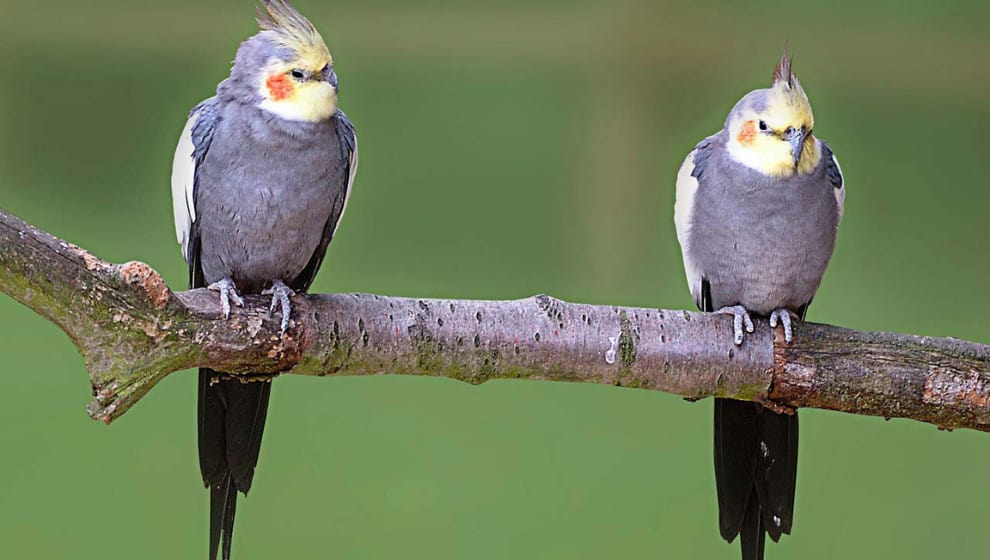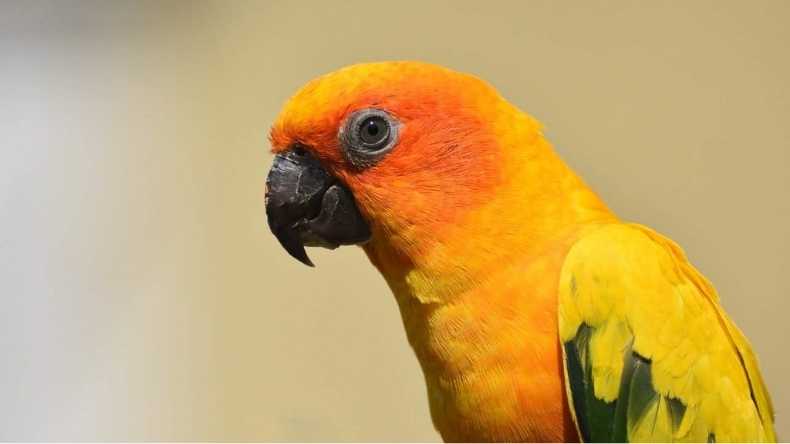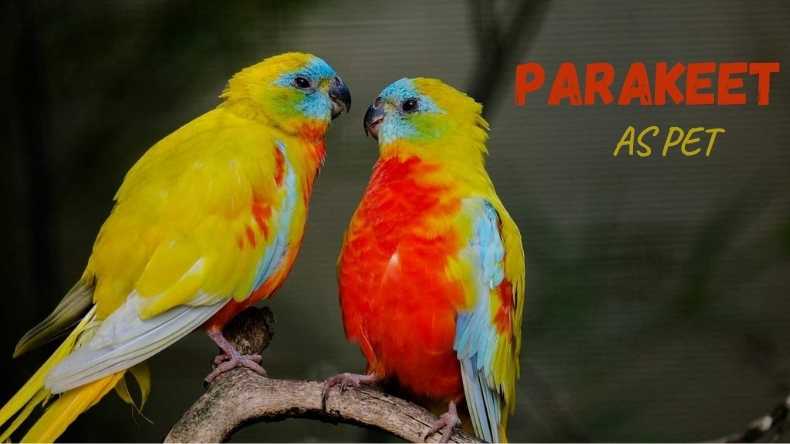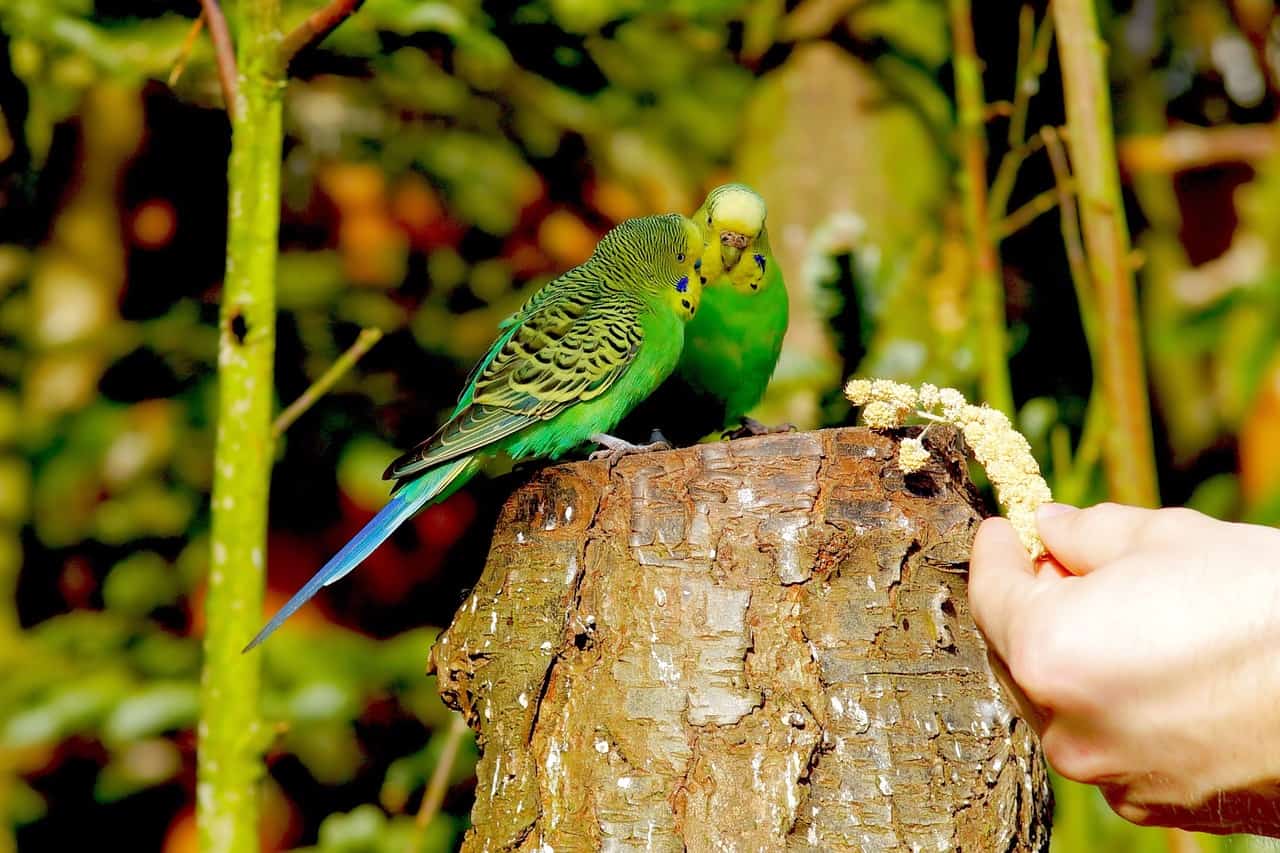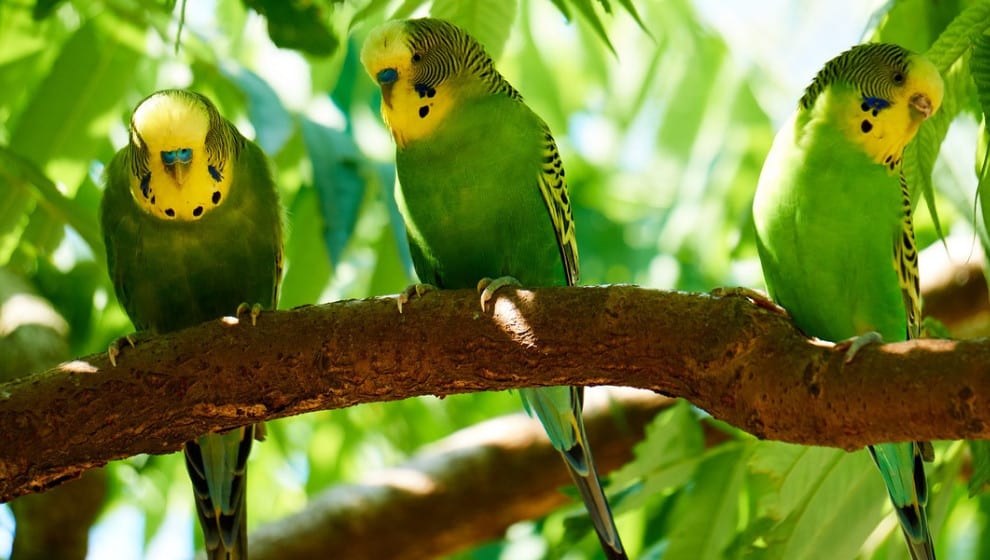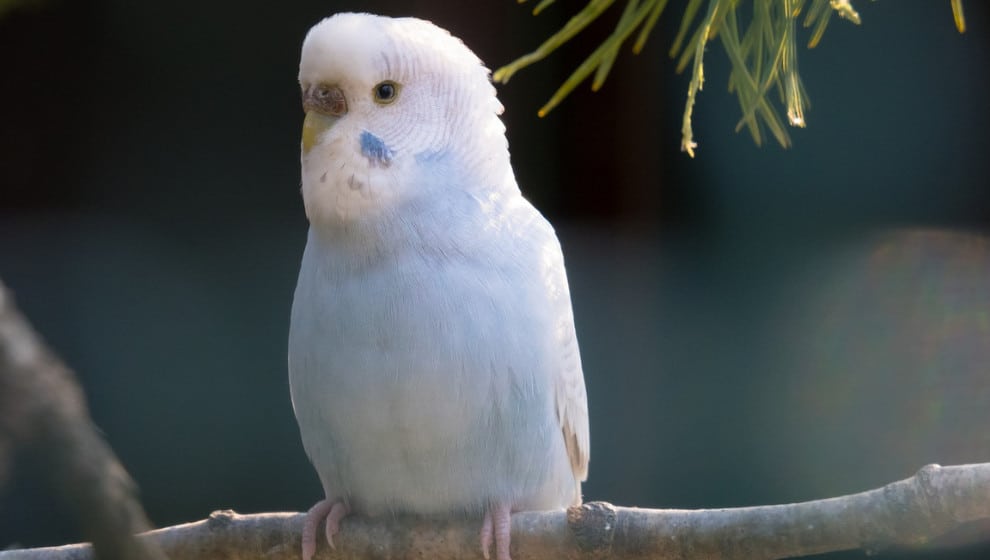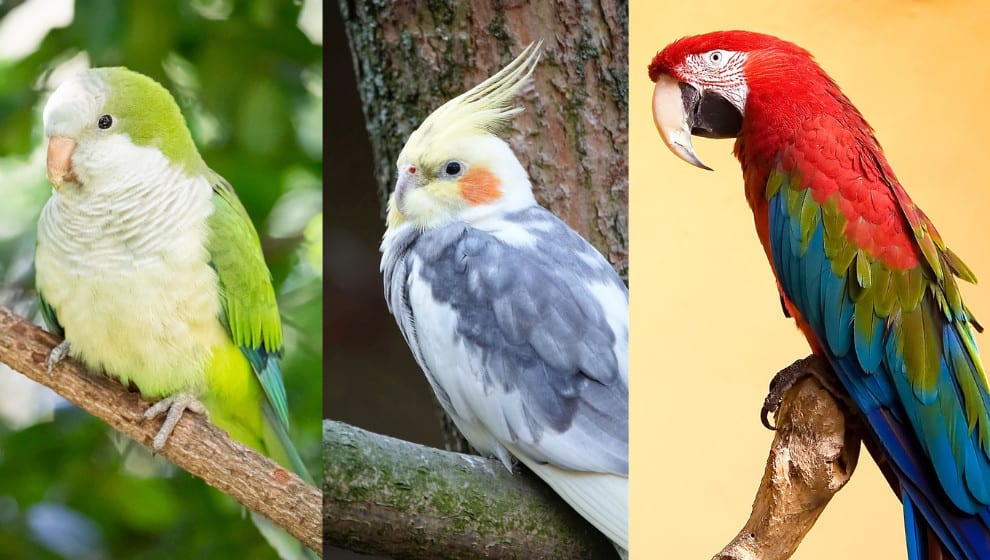Cockatiels are native to Australia and are widely distributed throughout the region. They have a dense population in the southwestern part of the continent. Owners of these feathered companions find them as companionable as dogs and cats.
Table of Contents
Cockatiels As Pets
Although cockatiels are native to Australia, they are the most popular parrot pets in America as they have proved themselves excellent to be maintained. Cockatiels are tamed and are curious birds that are known for their crests.
Generally, cockatiels are friendly and gentle, and they often develop rituals like petting, preening, and scratching with their owners. When they wish to be petted, they lower their heads or nibble at their owner’s fingers to indicate they want to have their head and neck scratched. These feathered companions do have a reputation for demanding attention from their owners regularly.
In short, you cannot take cockatiels like an ornament that you forget after putting them in the cage. They need lots of proper attention and care and the most important, the time you spend with them. Cockatiels need social interaction because they are highly social birds.
Cockatiels Lifespan In General
The lifespan of cockatiels can vary slightly between wild cockatiels and domestic (pets) cockatiels. However, research has shown that cockatiels’ life expectancy can be extended by a decade or more with little help from their owner.
In the wild, cockatiels live in the folks, and Australia’s crowded corners can often lead to diseases and infections. Consequently, the average life expectancy of cockatiels in the wild is lesser than the captivity. While in captivity, proper nutrition extends their life span surprisingly.
When we talk about life expectancy based on gender, the male and female cockatiels have an almost similar lifespan. Both can live a longer life if prevented from any accidents, and there is no notable difference.
Thus, when you plan on buying cockatiels and want them to be with you for an extended period, make sure to learn about how long your cockatiels live in captivity and play your part to help your cockatiel live the most extended, healthiest, and happiest life possible.
How Long Do Cockatiels Live In The Wild?
The life of cockatiels in the wild is not always easy. The land that these cockatiels inhabit can be harsh, and many flocks of these birds need to be nomadic to find the water and food they need to survive. Although they are swift fliers and have gray camouflage coloration, they do not have any defense against natural predators.
Despite these facts, cockatiels can make their lifespan in the wild relatively better if circumstances are favorable. The average lifespan of cockatiels in the wild is 10-15 years. This span can be much less if the bird is unlucky. Also, many chicks do not even make it to adulthood at all.
Why Does The Lifespan Of Cockatiels In The Wild Be Lesser?
Many reasons make their lifespan much lesser in the wild than in captivity. Cockatiels in the wild have to evade predators, depending on its body to fight diseases and infections, migrate to find food and water, and find shelter in bad weather.
Predators
Raptors hunt cockatiels in the sky mainly while feeding them on the ground. Apart from their gray camouflage feather and migrating in large flocks, cockatiels have no proper defense mechanisms. Therefore, cockatiels can get an only response by having a quick trip. More predators shorten their lifespan.
Diseases
Psittacosis – a disease that affects cockatiels and also can be transferred to humans. Many disease-causing bacteria infect cockatiels in the wild. Then, the lifespan of cockatiels depends on their immune system to fight against the diseases.
Food And Water
Food and water are essential for the survival of any living being. Cockatiels in flocks usually have to make long flights between water sources, foraging grounds, and roosting places.
Cockatiels live near the water sources and farmlands. They feed on the cultivated plants; therefore, they have even considered pests in many parts of Australia.
They do not have an assurance of daily food or water in the wild. In rare and extreme cases, cockatiels can die from hunger and thirst.
Adverse Weather Conditions
Unfavorable conditions can either cause diseases or even kill these birds. They are warm-blooded and live in hot and dry regions. Therefore, extreme cold conditions can cause lethal harm to them and shorten their lifespan. Cockatiels adapt to the changing climate and weather by migrating.
How Long Do Cockatiels Live In Captivity?
You must have guessed that lifespan of cockatiels in the wild is lesser than in captivity. But this extended lifespan in captivity is only dependent upon their owners. So, the owner is responsible for ensuring that their cockatiels make it to a respectable age.
Pet cockatiels are entirely dependent on the care provided to them. It would help if you did as much research as you can before you get your bird and not stop learning once it is in your care.
If you have well-cared your feathered friend, then your cockatiel can be around you for a very significant chunk of your life. Without any genetic defect or unlucky accident to cockatiels, up to 15 years lifespan is attainable. Pet cockatiels with the best care by every possible means provided to them can make up to 20 – 25year lifespan. Pet cockatiels have been known to live as long as 35 years.
Factors That Affects Cockatiels Lifespan In The Captivity
The life expectancy of cockatiels in captivity is entirely dependent on how their owner is keeping them. Therefore, it is up to the owner to give a home and long life to their friend. Diet is the main factor when it comes to the increased lifespan of these birds. The main factors on which the life expectancy of cockatiels is dependent in captivity are:
- Nutrition
- Housing
- Healthcare
- Physical Wellbeing
- Emotional Health
General Care For Your Cockatiels
To take the primary care of your cockatiel, you must consider these critical points:
Cockatiel Cages
For their homes, it is best to buy the biggest cage you can afford. But, if you keep your cockatiel out of its cage most of the day, then a smaller cage is acceptable. You should always purchase a cage with safety in mind as it will be a home for your bird majority of its life.
High-quality stainless steel or powdered coated cage is best as cockatiels will destroy light wire bars and plastic-coated cells with their beaks. Ensure installing a grate across the cage’s bottom so they do not eat their droppings.
Perches For Your Cockatiel
For your cockatiel, it is best to provide a mixture of perches. Maintaining good foot health is vital as your bird relies on its feet during everything it does, even sleeping. Nests of varying materials made with different materials will help them exercise their feet. For natural perches, make sure that the wood is safe and made from trees that have never been treated.
Toys
Cockatiels love to use their extremely strong beaks. Chewing is one of their favorite hobbies, and they get pleased by shredding plenty of toys into pieces. Twig balls, vegetable-tanned leather strips, and toys made raffia or palm strips are the best options.
Like bigger bird breeds, cockatiels love toys made of ice-lolly sticks and wood, and balsa wood toys are their favorites.
Training
As cockatiels are intelligent birds, the most important thing you can do for them is train them to step up. While starting training, you can begin with pressing your fingers gently up under their chest, in front of the feet. Say “up” or “step-up” while doing this. Repeating this command and regular practicing will quickly teach your bird the desired outcome.
Bathing
They love enjoying bathing and showering with their owners also. For this purpose, you can purchase special perches, or many of them happily sit on their shower rod. Furthermore, as cockatiels are dusty birds, bathing helps them keep this at bay.
How To Increase Your Cockatiel Lifespan In The Captivity?
It is essential for your cockatiel to be healthy and happy to increase their lifespan. Many factors influence your cockatiel’s health. Although some genetic factors are not in your hand and you cannot do anything about them, many others are in your hands. These factors are:
Diet
Just like in humans, a proper diet is crucial in keeping a cockatiel healthy and happy. There is a myth that a cockatiel thrives on a diet only comprises of dry seeds. Seeds indeed make up the most of cockatiel’s diet in the wild. But, the seeds that you buy from pet stores are a mixture of fresh seeds with some sprouted seeds.
Some of the oldest birds have survived on a diet of seeds only, but with a less fatty and varied diet, pet cockatiels’ chances of living a long life increase significantly. Their diet should not be calorie-rich as their daily energy expenditure is considerably less.
For your cockatiel’s diet, a high-quality seed mix on your hand is enough. Also, it would be the best if you mimic the natural diet by offering a wide variety of cockatiels.
- Fresh fruits: mango, berries, apple, and many more will work.
- Fresh vegetables: you can try almost all vegetables, but leafy green vegetables are preferred.
- Sprouted seeds: you should try sprouted bird seeds and legumes.
- Treats: When you train your cockatiel, you can treat them with honey seed sticks, millet, and similar snacks for motivation.
- Extras: pasta, lentils, unsalted rice, herbs, boiled eggs, some garden weeds, and some wild grasses can help you to keep your bird busy for hours.
- A mineral block is generally a good option.
Water
Water is one of the essential components of cockatiel’s ration. Access to fresh water all the time is a must for the birds. Make sure to regularly change the water to avoid any contamination that might cause any poisoning.
Hygiene
Hygiene maintenance is essential for cockatiels’ health. An unhygienic environment can cause diseases and shortening of the life of the birds.
Socialization
Cockatiels are very friendly. If they stay in the cage for most of the day, they will become sad and lonely, resulting in aggressiveness. If you have only one cockatiel, then its only friend is you. When pair of birds, they do not depend that much on the humans then. Cockatiels still need attention from their owner. Teach your cockatiel how to talk can be a great bonding experience for both of you.
Stress-Free Environment
Socialization is essential for cockatiels’ mental health, but a stress-free environment is another crucial factor for this purpose. They are very sensitive to changes, i.e., new cage (home) and new mates can frighten them, and sometimes stress is very successful that it can even cause the death of the cockatiel. To be healthy and happy, cockatiels need to feel safe.
Healthcare
Timely medical care is needed for the long and healthy life of pet cocktails as they cannot tell us what is wrong with them. That is why we have to observe them, and on showing any deviation from the expected condition, immediate actions are needed to be taken.
Here Are Some Pro Tips To Increase The Lifespan Of Your Cockatiel:
- Never leave your pet alone with other pets.
- It would be the best if you do not leave cockatiel unsupervised with kids.
- As they are ground feeders, please do not allow them to stay on the ground for too long.
- Provide filtered UV rays to them.
- Direct contact with sunlight is not suitable for your cockatiel, so always provide a source of shade.
- To prevent dehydration, the availability of freshwater all the time is essential.
- If your cockatiel seems sick or tired, immediately consult with a veterinarian.
- Add enough minerals and calcium to their diet.
Verdict
Cockatiels are very loving and adorable birds. They can be your perfect life companions. With a bit of care and love, they respond with a lifetime of loyalty and love. Cockatiel’s life span entirely depends on the home their owner gives them.
They do not only deserve excellent living conditions and a healthy diet, but they need to be loved a lot. If you have performed all the responsibilities very well, your cockatiel will surely live a long life.

